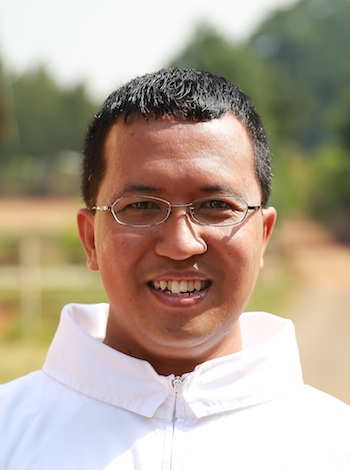William Paul knows well the challenges that come with preparing Myanmar men for the priesthood: the young man from Western Bago Division was just 21 when joined the Jesuits in 2005, and saw first hand the impact of the country’s authoritarian military dictatorship on his fellow novices.
“Here we have a fear, because of living under the military, a kind of fear to open up oneself to the other person, especially those who have authority,” he says.
“In the schools we were never taught how to think freely or how to form ourselves confidently. Language is one part, but in terms of thinking there are some blocks that I see. This is a challenge for intellectual formation.”
Myanmar – like many nations in crisis – has experienced a surge in vocations, and the Jesuits believe that the challenges inherent in forming young men from an oppressed populace are best handled with close involvement by one of their own. To this end, William Paul, who is doing currently doing his regency, is developing the candidature program in an attempt to strengthen the formation of Myanmar Jesuits, with a particular focus on discernment.
“Here people enter at a young age. Even when I joined the Society of Jesus, I had mixed motivations which later I had to discern,” he says. “What we want is to have mature candidates who’ve had work experience, i.e. experience of living with some independence. I want to focus more on intellectual preparation and to build up mature relationships with the candidates.”
The Superior for Myanmar, Fr Mark Raper SJ, says the judicious formation of candidates is of particular importance in Myanmar, where poverty and religion have prompted a growing interest in vocations from young men.
“They come from strong faith communities and there’s almost a channelling of the ones who have heart, and the interest in it, to educational opportunities in the seminaries, which put them on the track towards a vocation,” he says.
“[But] the choice made in the early stages has to be confirmed at different points in their course of studies. When they realise so many other openings for them are there, they have to reaffirm their commitment to this choice. We have to also be careful in the formation that they don’t just roll on from one stage to the next.”

“We just help them as much as we can to process [their intentions] so that they can decide alone, they can have opinions alone. Hopefully in our formation they are able to discern about their direction of life, whether or not they are called to become a Jesuit or they are called to become a lay person,” he says.
“But I think this is the biggest challenge for me: how to help them to have a major decision in their life. I think their process of individuation – to become a really independent person and to decide and say, ‘This is my decision, not someone else’s decision’, that is challenging.”
While Myanmar has large numbers of religious, until May this year it did not have any Jesuit priests. Fr Wilbert Mireh SJ became Myanmar’s first Jesuit priest when he was ordained in May; Titus Tin Maung SJ and Joseph Aik Maung SJ were ordained deacon on September 14 and are expected to be ordained next year. And local and international scholastics consolidate the mission of the Jesuits in Myanmar by working on various educational, social and formation projects in the country.
“It’s a country which has been isolated for so long, we feel that it’s appropriate to recruit people to the Society here because of the special contribution that the Jesuits can make because of our universal mission and because of the type of vision or perspective that Jesuits may offer within the church,” says Fr Raper.
“We feel we have a great service to offer in Myanmar in complimenting the existing vocations. It’s true that some of these young men will serve in other parts of the world also, but that’s simply our mission.”
And the benefits of forming local Jesuits has other, long-term implications: it establishes a foundation of local Jesuit knowledge which the novices of the future can tap in to, and gives Jesuits the opportunity to engage in civil society from within, says Fr Raper.
“We’re still laying the foundations but already we’re discussing with the scholastics whether they’ll specialise in education, biblical studies or agriculture or social research or management. They’re going into a number of areas that will prepare them so that we’ve got a more broadly competent community.”
Main picture: New deacons Titus TinMaung SJ (L) and Joseph AikMaung SJ with Fr Wilbert Mireh SJ, the first Myanmar Jesuit priest (centre).


